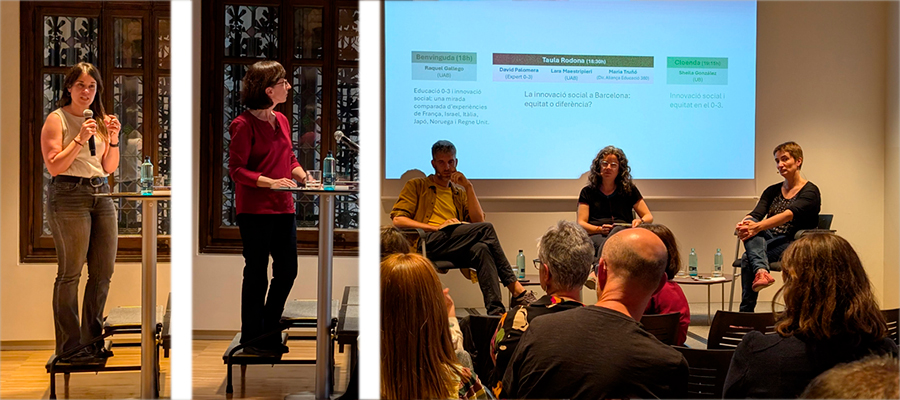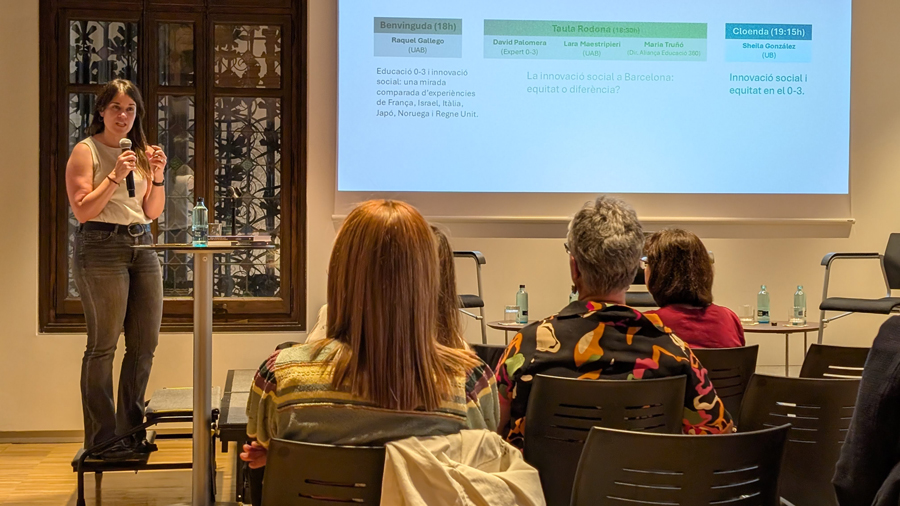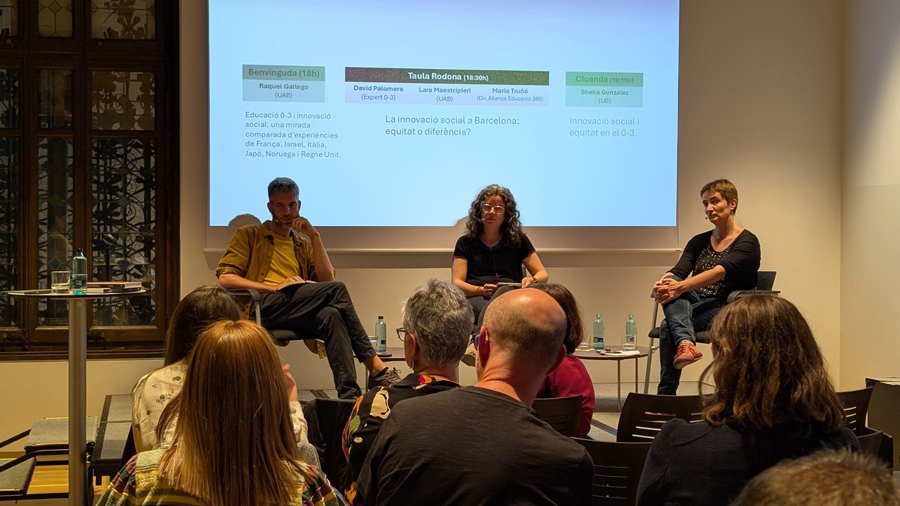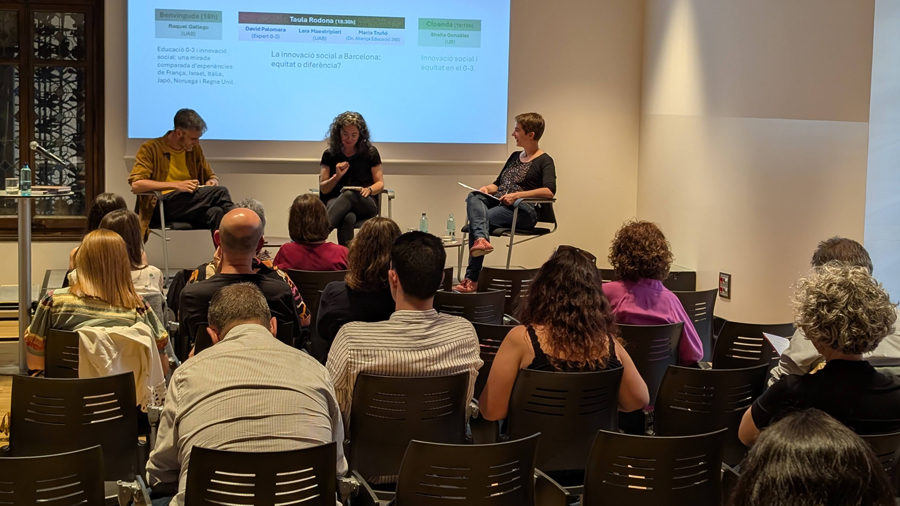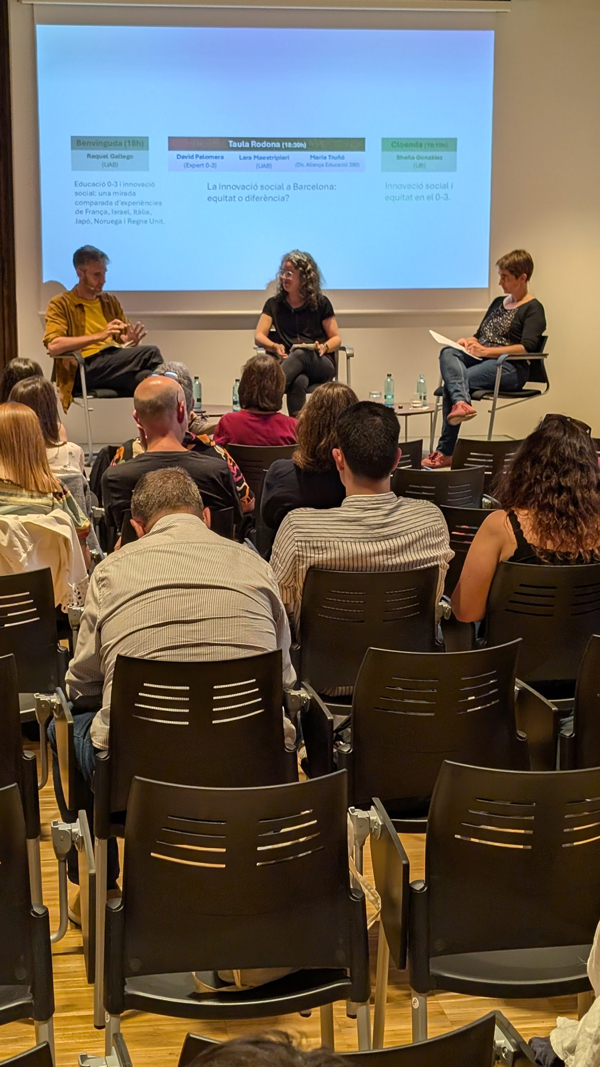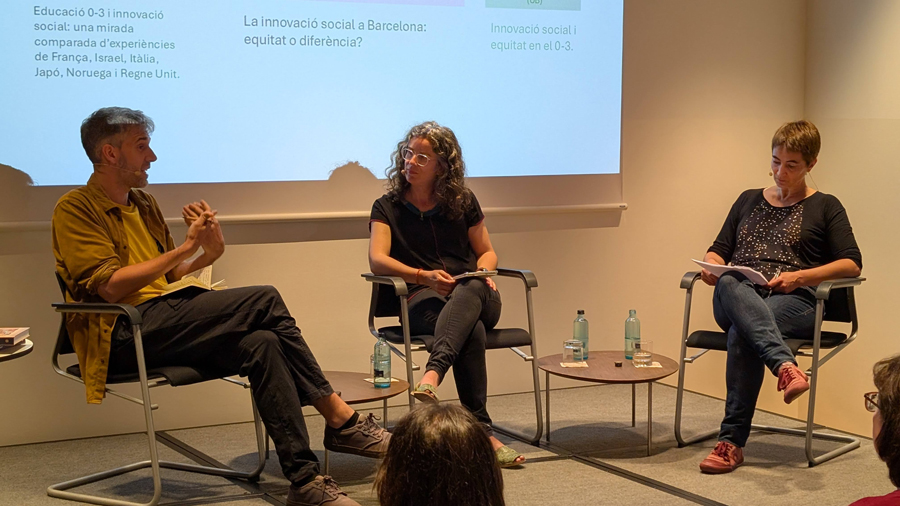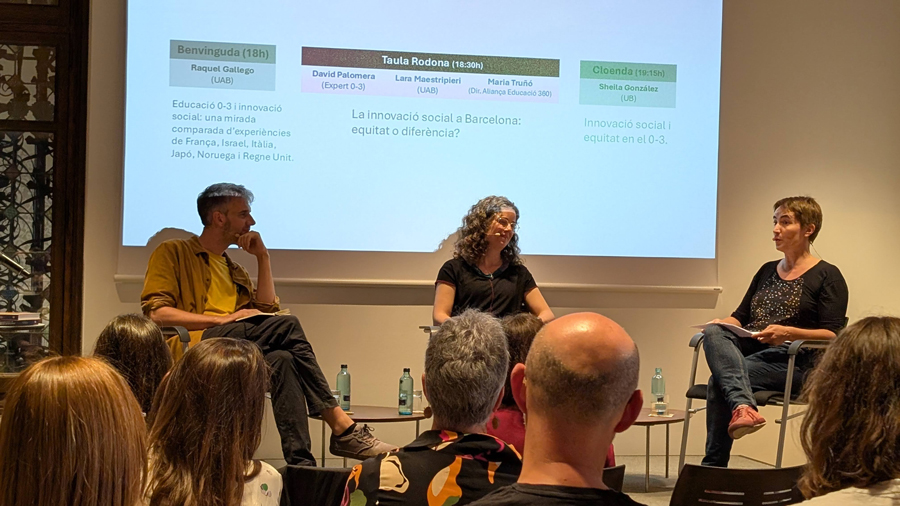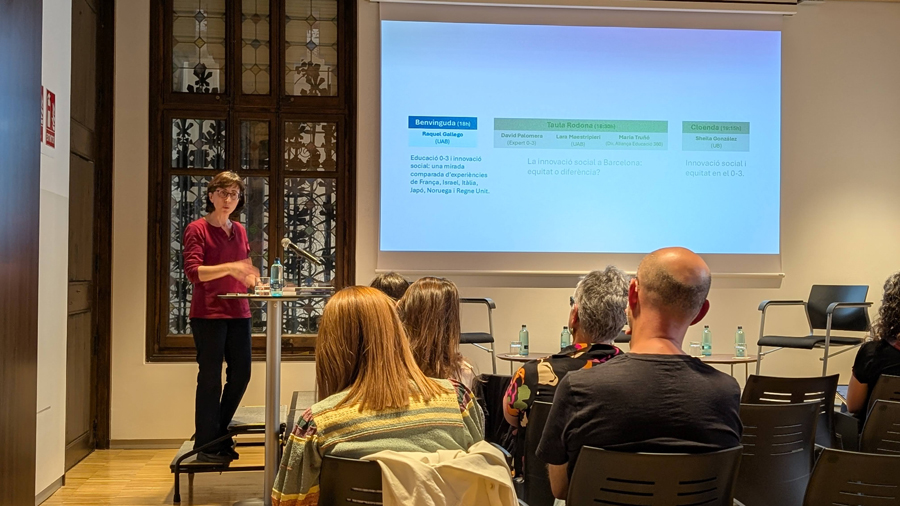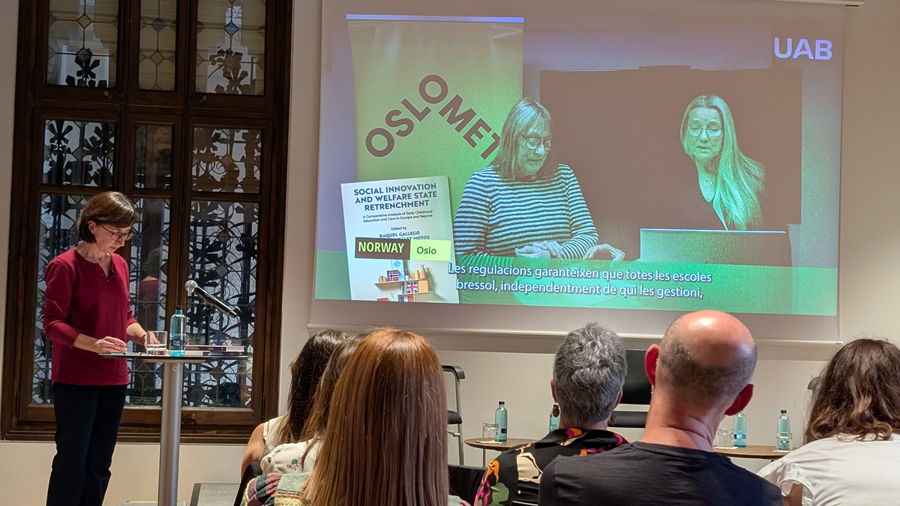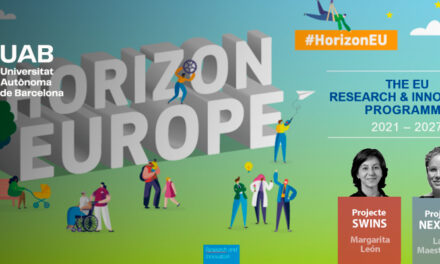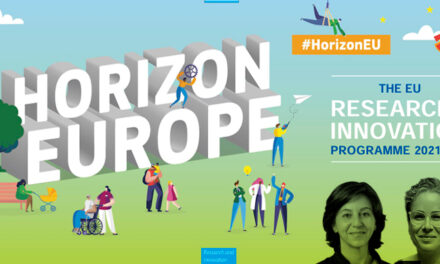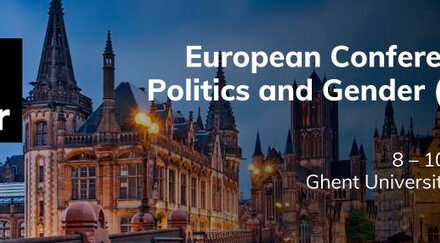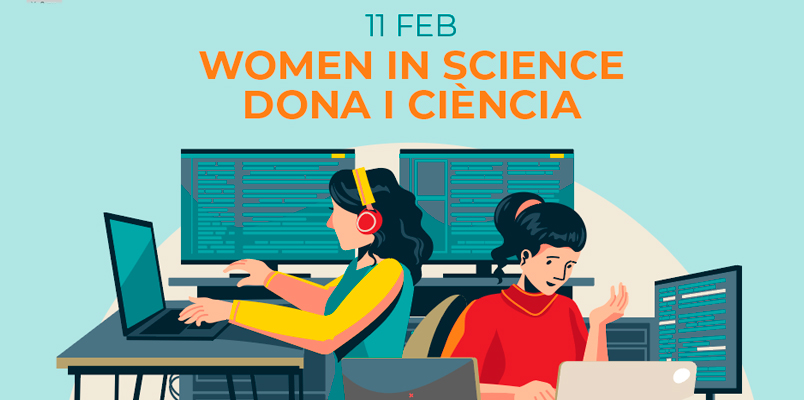Researchers from IGOP-UAB and the University of Barcelona presented the main findings of a comparative study in which, together with other scholars, they analyzed the impact of social innovation in early childhood education and care across various international contexts, including the city of Barcelona. The presentation took place at Palau Macaya during the event “From Tokyo to Barcelona”, organized by IGOP-UAB and Fundación La Caixa.
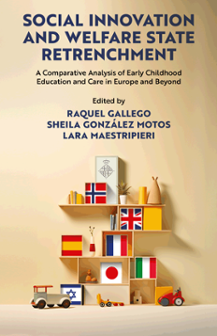 The study has been included in the book Social Innovation and Welfare State Retrenchment. A Comparative Analysis of Early Childhood Education and Care in Europe and Beyond (Emerald Publishing), edited by Raquel Gallego, Lara Maestripieri, (IGOP-UAB researchers) and Sheila González Motos, professor at the Faculty of Law of the University of Barcelona. The study has had the participation of the Institute of Government and Public Policies of the UAB and has been funded by the La Caixa Foundation.
The study has been included in the book Social Innovation and Welfare State Retrenchment. A Comparative Analysis of Early Childhood Education and Care in Europe and Beyond (Emerald Publishing), edited by Raquel Gallego, Lara Maestripieri, (IGOP-UAB researchers) and Sheila González Motos, professor at the Faculty of Law of the University of Barcelona. The study has had the participation of the Institute of Government and Public Policies of the UAB and has been funded by the La Caixa Foundation.
The book examines how social innovation can contribute to ensuring equity and the universalization of services for children aged 0 to 3 — an area where social investment is essential to promote equal opportunities and reduce gender and educational inequalities. It offers an innovative research design studying the institutionalization of social innovation in Early Childhood Education and Care (ECEC) through seven case studies across Europe and beyond.
One of the main conclusions is that social innovation has become a key element in the transformation of the welfare state. In four of the seven cases analyzed (Oslo, Seine-Saint-Denis, Venice, and Tokyo), it is shown how institutionalizing social innovation can improve the integration and accessibility of public early childhood education services. In three other contexts (Portsmouth, Barcelona, and Tel Aviv), social innovation is shown to fill the gaps left by the market and the state, covering family needs where public provision is limited. However, in all cases, regulating social innovation is crucial to prevent socioeconomic bias.
Social Innovation in Barcelona: Equity or Difference?
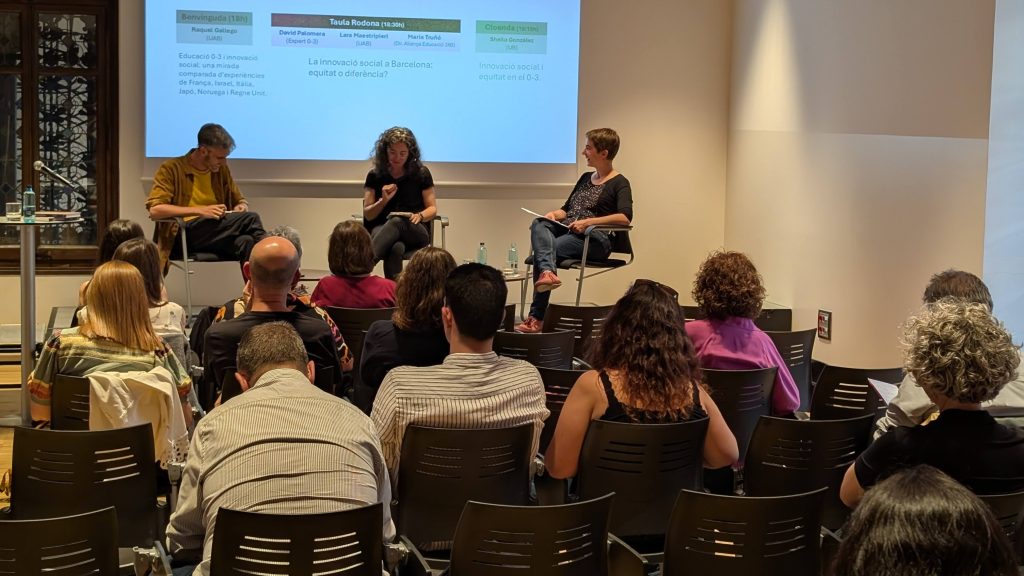
The event included a roundtable moderated by Lara Maestripieri (UAB), with participants David Palomera (expert in 0–3 protection systems) and Maria Truñó, former Education Commissioner for the Barcelona City Council. The debate addressed issues such as: What are the most notable advances and innovations in 0–3 education in Catalonia? What role should social innovation play? What political proposals should be adopted?
According to Palomera, Catalonia suffers from a “lost decade” during which austerity measures (2011–2019) hindered its historical advantage, and today, in Barcelona, “50% of the demand is unmet in public centers.” This burden, he claims, casts doubt on the rhetoric of innovation: “Talking about social innovation often hides the lack of public initiative.” He highlighted cost reduction through income-based pricing as the main advance and sees the budget recovery and Next Generation funds as “a window to institutionalize and structure funding”, but warns that unless consolidated, free provision may disproportionately benefit those already with resources.
His roadmap includes strong public leadership working alongside social initiatives, combining workforce dignity — “many private-sector teachers take civil service exams just to survive” — improved staff-child ratios for early detection, and a “caring city” model with flexible 0–1 services (community centers, support spaces) so that classrooms are “just meeting points” in a wider care ecosystem where mothers’ work is recognized and men are also included in caregiving. He also warned that community-led innovation without state involvement could “deepen territorial inequalities”, especially in municipalities with limited fiscal capacity. He stressed the need to reform municipal financing and collect data and indicators to assess what works and what doesn’t.
Maria Truñó, former Education Commissioner of the Barcelona City Council and director of the Education 360 Alliance, emphasized early childhood as a social investment and celebrated that 0–3 has gained ground on the institutional agenda — “we’ve gained space for 0–3 on the social agenda” — but warned that free provision “has masked equity: those who need it most don’t always access it.” She insists that universalization only makes sense “with equity criteria,” prioritizing vulnerable children via income-based pricing (including food) and seat reservations coordinated with social services. She also advocated for expanded parental leave.
Her most solid public innovation bet is the Family Childcare Space Network, which grew from 10 to 27 facilities and, as she noted, acts as an “entry point to the education system” for families — especially migrants — who are reluctant to delegate care during such early stages. She also calls to “diversify services,” with nursery schools as the backbone (flexible hours, regulated childminders, home services), as families are increasingly unequal and diverse, and “we still think needs can be standardized.” Finally, she calls for a cross-departmental 0–6 perspective: “It’s a mix of education, care, and social action — hybridizing is essential to scale up.”
The event highlighted the fundamental contribution of this study in understanding how the interaction between social innovation and public policy affects equity and well-being in advanced capitalist economies. The findings, researchers emphasized, underscore the need for a flexible policy framework that enables the integration of innovative solutions into early childhood education services, ensuring accessibility and quality for all families.
Educació i cures a altres països
